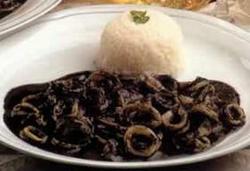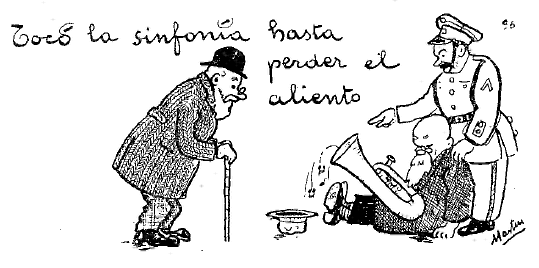
| Языки :: Испанский |
| Аудио |
 |
|
|
285 |
Español |
Spanish |
|
Lección Noventa y seis (96) |
||
| Nuevos descubrimientos | New discoveries. | |
| 1 |
Hoy al almorzar descubrí dos mundos nuevos. Fueron primero los calamares en su tinta (1). |
To day, while [in] having lunch, I have discovered two new worlds. It was first the calamaries "in their ink". |
| 2 | Los empecé a comer tímidamente, pues el aspecto viscoso de aquellos bichos nadando en tinta de china me daba algún recelo; | I have begun to eat them timidly, because the viscous aspect of these animals swimming in their Indian ink gave me some apprehension; |
| 3 | pero bien pronto me dejé convencer, por el tufillo de la salsa que halagaba al olfato de un modo irresistible, y mis convicción no tardó en volverse entusiasmo. | but very quickly I let myself be convinced by the fumes of the sauce which flattered the nose in an irresistible way, and my conviction was not long in becoming enthusiasm. |
| 4 | Así aprendí que en materia culinaria no hay que tener prevención (2), y más importa el olfato que la vista (3). | I have learnt thus that in culinary matters, one must not have prejudices and that smelling is more important than sight |
| 5 | Por eso, cuando a continuación me trajeron (4) una paella valenciana, arremetí con ella (5) sin reparar en lo disparatado (6) de su composición : | That is why, when, afterwards, they have brought me a dish of Valencia rice, I have tackled it without paying attention to the disparity of its composition : |
| 6 | había que ver que sobre una base de arroz venían pimientos, tomates, guisantes, almejas, langostinos, algo de pescado, algo de pollo, algo de jamón y no sé qué más : un arca de Noé, señor. | one had to see that on a base of rice, came pimentos, tomatoes, green peas, mussels, crayfish, a little fish, a little chicken, a little ham, and I don't know what more; a Noah's Ark, sir. |
| 7 | Pues bien, desde los primeros bocados me convencí que todo aquello se harmonizaba, formando una portentosa sinfonía de sabores. | Well, from the first mouthfuls, I have convinced myself that all this was in harmony, forming a marvellous symphony of savours. |
| 8 | Estuve tocando la sinfonía hasta que perdí el aliento, y bien creo que, terminado el último compás, todavía me chupé los dedos. | I played the symphony until I lost my breath, and I do think that, (once) ended the last bar, I still licked my fingers. |
| EJERCICIOS | EXERCISE : | |
| En la Casa de Correos. | At the Post-Office. | |
| 1 |
¿Tienes que hacer? — No. — Entonces ven conmigo a la casa de Correos. |
Have you (anything) lo do? — No. — Then come with me to the post-office. |
| 2 |
¿A qué vas? — A ver si tengo algo en la lista de Correos; además tengo que mandar un giro postal y yo solo no me sé arreglar. |
For [at] what do you go (there)? — To see if I have something poste restante; moreover I must send a postal order and, by myself, I don't know how to manage. |
| 3 |
Bueno, ya llegamos; adelante. — Con permiso. |
Good, we are [arrive] there already. Pass before (me). — Pardon me [with permission]. |
| 4 |
Mira, ahí tienes varios papeles : estos son para valores
declarados; ésos para cheques postales; aquéllos para paquetes y envíos certificados. |
See, there you have several forms; these are for insured parcels; those for postal cheques; these others for registered parcels and letters. |
| 5 | Coge uno de esos amarillos que son los de los giros postales. | Take one of these yellow ones which are those of the postal orders. |
| 6 | Ya está; dime ahora lo que he de hacer. | Here you are; now tell me what I have to do. |
| 7 |
Bien fácil es : escribe en estas líneas las señas del
destinatario; luego pon las tuyas en este sitio; la suma que quieres mandar, la has de poner aquí en cifras y allí, más abajo, en letras. |
It's very easy; write on these lines the address of the addressee, then put yours in that place; the sum you want to send you must put here in figures and there, lower down, in full [letters].. |
| 8 |
¿No hay más? — No, hombre, haz lo que te digo y ten cuidado con los borrones, que siempre traen líos. |
There is no(thing) more? — No (old) boy; do all that I tell you and mind [have care with] the scrapings which always bring about unpleasantnesses. |
| 9 |
Ya está terminado. — Muy bien, ahora vete allá, a la taquilla número 8, y da tu papelito al empleado. |
Here it is [already it's finished]. — Very well; now go there, to window number 8, and give your little paper to the clerk. |
| NOTES. | |
| 1 |
The calamari is a mollusk resembling the cuttlefish and like the
latter, secreting a black liquid. It is with this "ink" that they prepare the gravy which goes with it The calamary is known on the Spanish coast under the name of chipirón. |
| 2 |
Hay que, it is necessary (cf. to have to); before an infinitive only; había que, it was being (or used to be) necessary; hubo que, it was necessary; habrá que, it will be necessary. |
| 3 |
The five senses (los cincos sentidos) are : el gusto, taste; la vista, sight; el oído, hearing; el olfato, smell; el tacto, touch, feeling. |
| 4 |
Trajeron, they (somebody) brought me; irregul. past of
traer; traje, I brought; trajo, he brought; si trajera, if I was bringing; que yo trajese, that I (should) bring. |
| 5 |
Arremeter con, to grapple with, attack, fall upon. Don Quijote arremetió con los molinos de viento : Don Quixote fell upon the wind-mills. |
| 6 |
Lo disparatado de : what is ill-matched in. We shall see in the next revision lesson (n° 98), the special part of this neuter article lo. |
|
As in the preceding lesson, practice replacing tú by usted,
in the exercise of La Casa de Correos; check your verbs at the same time : 1 Tiene usted, ... venga, ... — 2 va ... — 4 mire usted, ... tiene — 5 ... coja ... — 6 dígame ... — 7 escriba ... ponga ... quiere ... ha ... — 8 ... haga ... le diga ... tenga. — 9 ... vaya ... dé su papelito. |
|
|
The irregular forms of the imperative of tú. Ven, come (from venir); ten, have (tener); pon, put (poner); haz, do (hacer); di, say (decir); díme, tell me; ve, go (ir); vete, go away. You can also remember : sal, go out (salir), and sé, be (ser); sé bueno, hijo mío, be good my child [son]. The use of adelante, with a certain tone, is equivalent to an actual imperative : go forward, go before. In a conversation, one will also say : ¡adelante! to encourage somebody to speak on. In the same way : ¡arriba!, up, can be understood as : go up! ¡Arriba con la maleta, mozo! (come) up with the suitcase, boyl ¡Atrás! back : step back! — ¡Abajo!, down : get down! |
